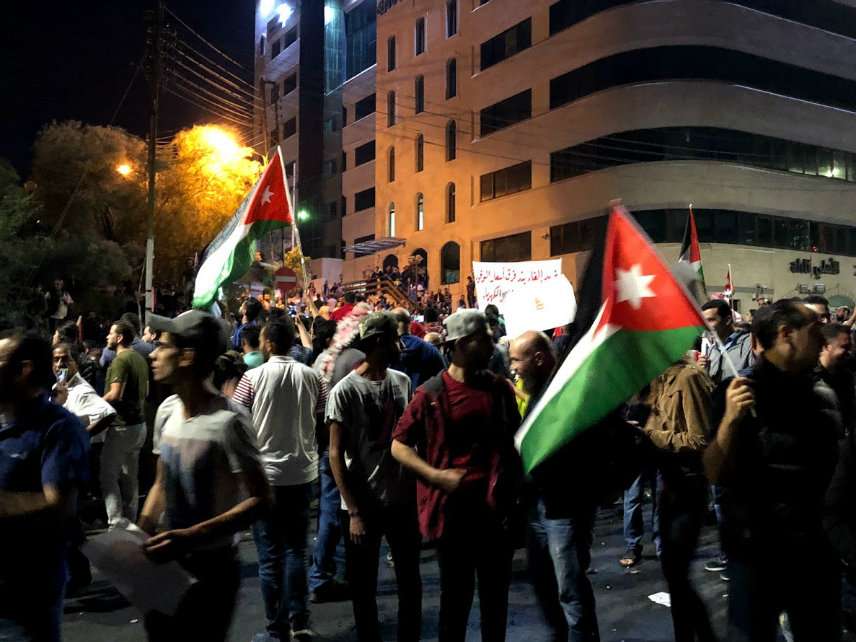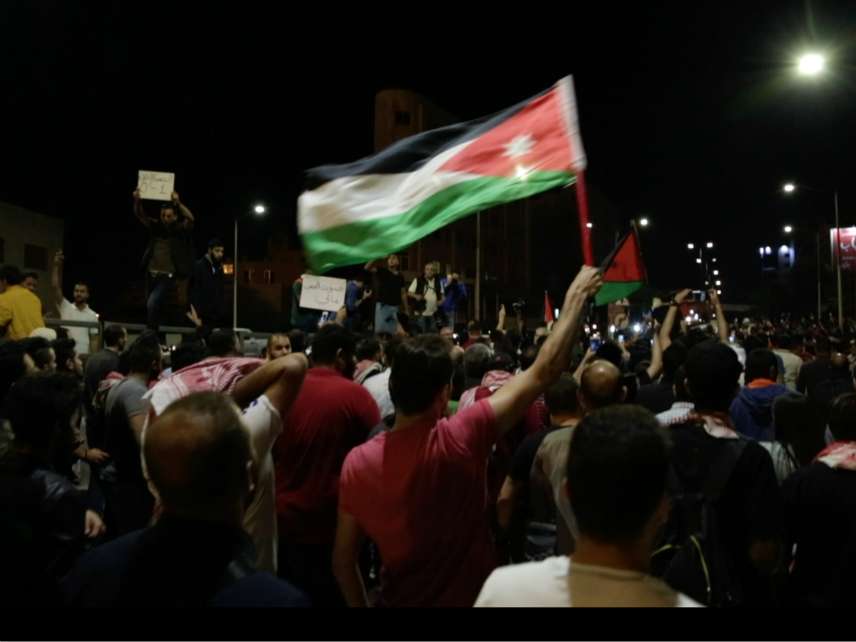In Jordan, Labor Unions and Businesses Have Joined Forces to Fight an Unpopular Tax Bill
Tax increases aimed at balancing the government budget have squeezed the poor and middle class and sparked a wave of protests.

AMMAN, JORDAN—Every night, the crowd at Shmeisani Circle chants "ooh, ah, thief government!" and waves Jordanian flags. An unlikely alliance of labor unions and business owners have united against an unpopular tax bill, setting off a series of daily protests at a major highway roundabout in Amman, the capital of Jordan. Their movement started on May 31. In just four days, they forced the Prime Minister to resign.
Jordan, a constitutional monarchy in the Middle East with a population around 10 million, is experiencing its most widespread unrest in years. While the kingdom has not suffered from the violence of some neighboring countries, it also does not have the oil wealth of other Arab monarchies. Tax increases aimed at balancing the government budget have squeezed the poor and middle class, sparking general strikes on May 31 and June 6, with days of spontaneous demonstrations in between.
The unrest has thrown the uneasy balance of power between the monarchy's appointees and the elected branches of government into focus. Despite political divisions seen elsewhere in the Arab world, the Jordanian people have shown incredible unity in opposing an expansion of state power by unelected officials.
The first signs of political unrest surfaced in January 2018, when the Jordanian government imposed sales taxes on staple goods and ended some food subsidies. The price of bread nearly doubled, sparking small demonstrations against Prime Minister Hani al-Mulki.
Then, in May, Prime Minister Mulki's cabinet proposed an amendment to the tax code. In addition to increasing all corporate and personal taxes, the bill would lower the minimum taxable bracket from the equivalent of $17,000 to $11,000 per year, and impose much harsher penalties for tax evasion.
These proposals added insult to injury. The average cost of living was already on track to increase 10 to 15 percent due to February's tax increase and subsidy cut. At the same time that it was providing less to its citizens, the state was asking for more.
The Amman Chamber of Industry warned that the bill would "contribute to less foreign investments and the closures of factories, and will consequently lead to the loss of jobs for many Jordanians." Remarkably, factory owners and organized labor are on the same side of this issue.
Jordan is currently facing a slow-burning economic crisis, caused by declining foreign investment and the war in neighboring Syria and Iraq. The official unemployment rate has risen to 18.4 percent this year, according to the semi-state-run Petra News Agency.
"Our wages are shit, and now with these taxes!" complains Amal, a student who has been attending the protests every night.
To some degree, outside powers have forced the government's hand. A coalition of Persian Gulf monarchies led by Saudi Arabia failed to renew a multi-billion dollar aid package last year, reducing state revenues by a large fraction. In order to secure a $700 million line of credit from the International Monetary Fund (IMF) over the next three years, Jordan has committed to reducing its deficit.
But a hotel worker named Ahmed, who doesn't give me his last name, complains that "there are a lot of other ways that they could do to support the economy other than taking from low income people."
I meet Ahmed at a sidewalk near the Prime Ministry a few days into the protests. He had decided to join the demonstrations on his way to work the night shift.
This heavy impact on the working class led unions to call a general strike on May 31. Their call was heeded by a surprisingly diverse coalition: Small businesses closed in solidarity, and the Jordanian Bar Association asked lawyers not to show up in court.
King Abdullah II scrapped a planned gas tax in an attempt to diffuse the situation, but after Prime Minister Mulki refused to take the income tax off the table, unions threatened a second strike on June 6.
In the following days, regular citizens began calling for rallies on Facebook and Twitter, both in the capital and in smaller cities. Most protests in Amman are concentrated Circle Four near the Prime Ministry and Shmeisani Circle near the Professional Associations Complex.

At these rallies, political party flags are few and far between—the most common symbol is the keffiyeh (checkered scarf) and Jordanian flag.
They aren't a gendered affair, either, as women are a visible presence.
Americans are used to thinking of the Middle East in ideological terms, but the protests are focused on bread-and-butter issues. Some people chant "the people want to bring down the system," a generic Arabic protest song used everywhere from Tunisia to Syria, but most slogans are related to the economy.
Because small increases in income and sales taxes are a life-and-death matter for many of Jordan's working poor, it makes sense that organized labor is leading such a diverse coalition against a tax increase—which may seem strange to Americans.
This isn't to say that the movement is against taxation on principle. Most participants are demanding a lower cost of living, whether that comes by repealing new taxes or bringing back old subsidies.
But one aspect of the tax law was jarring to Jordanians for more abstract reasons. The tax bill reclassified tax evasion as a felony (when previously it was a misdemeanor) and introduced filing requirements for all adults—whether or not they were in a taxable bracket. While this is normal in many Western countries, it's unprecedented in Jordan.
When the political elite is perceived as out-of-touch and unresponsive, people view such an expansion of the state's role in private life with much more suspicion.
Despite the seriousness of the issues, some of the protests have a festive air, especially as it is the Muslim holy month of Ramadan. Men, women, and children chat as they watch the crowd. A family has even set up shop selling coffee to the crowds in a lot opposite Circle Four.
However, the regime is not taking the situation so lightly. On June 3, Speaker of Parliament Atef Tarawneh petitioned the king to call an emergency session, announcing his own intent to vote down the bill.
The next day, Prime Minister Mulki resigned. King Abdullah replaced him with Omar Razzaz, the charismatic Minister of Education. In a statement from the royal court, the king called for a "dialogue" around the income tax bill, and asked the new government to "protect the low income and middle class and encourage investment."
But Amal is not convinced. "So you changed the name of the people in charge, but the taxes are still there," she says. "We won't stop the protests or the strikes till we start seeing those promises turn into reality."
The unions agree. Without concrete promises from Razzaz's government, they went ahead with their threat to strike again on June 6. Workers marched from Shmeisani Circle to the nearby Professional Associations Complex.
However, union leadership is not totally in control of events. When they asked members at the June 6 rally to give the government a chance, the crowd chanted, "To Circle Four! Our people don't retreat!"
The regime has so far made gestures towards respecting the right to protest. In a viral Twitter video, Crown Prince Hussein II was seen urging police to protect the people's freedom of expression.
"We're all here protesting peacefully," Ahmad tells me, "[The police] respect the decisions of the people."
But later that night, police fired tear gas between Shmeisani Circle and Circle Four, ostensibly to keep protesters away from the Prime Ministry. Amal says that the tear gas landed far from the protesters. She claims that some police even gave them water afterwards.
Al Bawaba reports that 60 people have been arrested as of June 5.
As we drive through Circle Four, Amal points out military police, who are normally not deployed against civilians.
The constitutional monarchy is at a crossroads. While the king still holds many exclusive powers—including appointing the Prime Minister—the resistance to the taxes is a sign of a growing democratic culture.
Although Amal says that removing Prime Minister Mulki wasn't enough, she acknowledges that it showed the people what power they hold.
The ruling elites' overtures could be the beginning of a more responsive government—or they could be part of simply passing the buck.
"Mulki says it's the World Bank and the IMF rules," Amal says, "but the IMF says they had nothing to do with this."
"Of course, the press release is in English," she adds, "so most of the country can't read it or understand it or every know about it."
Zachariah Crutchfield contributed reporting and translation.


Show Comments (17)